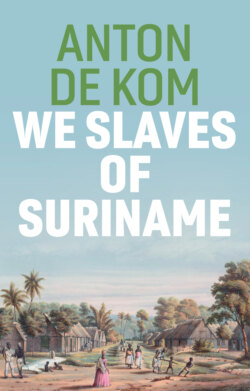Читать книгу We Slaves of Suriname - Anton de Kom - Страница 12
The Personal Decolonization of White Education
ОглавлениеIn the African-American literary tradition, we see similar depictions of heroes from the eighteenth century onwards. In 1853, Douglass wrote an essay about the heroic slave Madison Washington, and in The Souls of Black Folk, Du Bois grounded the Black thinker, teacher, and minister Alexander Crummell in the history of the American Reconstruction era. What such examples show is that the sense of inferiority stemming from enslavement, which De Kom discussed with the same sensitivity as Frantz Fanon, can be combatted through literary valorization. This amounts to the personal decolonization of white education. After his banishment, De Kom spent a great deal of time in the National Archives in The Hague and read the materials available to those outside the academic system.
Among African-American writers, the struggle to obtain information from outside the establishment was likewise crucial to the development of self-knowledge and self-confidence. To borrow books from the Chicago library, Richard Wright needed a note from a white sponsor. As he wrote in “The Ethics of Living Jim Crow,” “I would write a note to the librarian, saying, ‘Please let this n----- boy have the following books.’ I would then sign it with the white man’s name” (p. 14).
In prison, Malcolm X re-educated himself from the ground up by memorizing the dictionary. On the first page, he was struck by a word that comes from Afrikaans: “aardvark.” And the young Frederick Douglass challenged other boys to write words down so that he could learn them.
The very act of writing undermines colonialist prejudices about the supposed unintelligence of enslaved people. Such prejudices formed the pretext for denying them formal education. In 1845, Frederick Douglass published his autobiography, Narrative of the Life of Frederick Douglass, An American Slave. This slave narrative immediately became a huge success, and part of its radicalism lay in its subtitle, Written by Himself.
By writing literature, an enslaved person defies one important tenet of the slavery system: enslaved people can never hold a position of any significance in white society and will always need support. Writings by enslaved people were dismissed as hoaxes, and critics argued that they had actually been written by white authors. Even De Kom, who published We Slaves almost ninety years after Douglass’s book, met with this reaction. We Slaves was disregarded and belittled as “really written by Jeff Last.” The implicit claim was that De Kom, a Black man, could not possibly possess the ability to write such a book. That argument was used to exclude him from Dutch culture.
Furthermore, De Kom’s union activities and contributions to left-wing papers led to accusations of communism, and he thus came to be seen as a potential enemy of the Dutch state. In the United States, many African-American writers faced similar allegations in response to their political activities. The well-known gospel singer, actor, and activist Paul Robeson, for instance, was not permitted to renew his passport after the McCarthy hearings. Strikingly, De Kom’s biography notes that he used to hum Robeson tunes (Woortman and Boots, p. 261). Du Bois emigrated to Ghana for idealistic reasons, and Richard Wright to France.
The Surinamese-Dutch American Otto Huiswoud, who moved from Suriname to Harlem during the Harlem Renaissance and became involved in political activism there, also left the United States. After World War II, he moved to the Netherlands, where his positions included the presidency of Vereniging Ons Suriname (the “Our Suriname Association”; V.O.S.).
